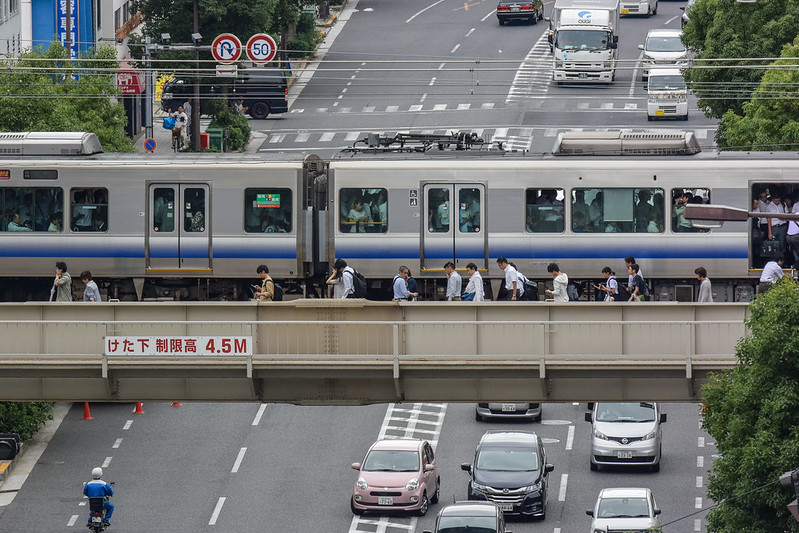
photo by m-louis
For Japan, 2024 started with a massive earthquake suddenly hitting the Noto peninsula on New Year’s Day. The M7.6 earthquake shaken the entire Japan at the very beginning of the year. Many people suffered from this disaster including temporary visitors from outside of the region who had returned there to see their families and stayed there for sightseeing. In Japan, the number of international tourists is soaring because of the weak yen. Those tourists have a possibility to experience earthquake anytime anywhere during their stay in Japan. Although most people enjoy holidays in Japan without any trouble, but it is still good idea to prepare for a possible disaster. So, what earthquake prevention should you take?
Earthquake country Japan
Geologically, Japan is located where four large tectonic plates and is prone to earthquakes. In addition to this year’s Noto Earthquake, large-scale earthquakes, such as the 1995 Great Hanshin Awaji Earthquake and 2011 Great East Japan Earthquake, hit every ten-odd year. Moreover, small-scale earthquakes are frequently observed on daily basis. For instance, intensity 1 or larger quakes were recorded more than 2000 times and 41 cases out of this recorded intensity 4 or larger.
Things to prepare before arrival
Smart phone app Safety Tips
First thing you want to get is Safety Tips, a smartphone app developed by the Japan Tourism Agency. This app notifies you of not only ongoing earthquake, but tsunami, severe weather warnings, and eruption reports, and other push notifications. Also, this has links of disaster action flow chart, communication card, and other useful sites. The easy-to-understand interface is provided in 15 languages including English, Chinese, Korean, Spanish.
Contact detail of the embassy/consulate general in Japan
Temporary visitors normally don’t need to contact the embassy or consulate of their country in Japan. But in an emergency situation, the embassy or consulates of each country may offer special disaster measures to their people. Note your country’s website, address, and contact number of the embassy/consulate in Japan.
List of embassies/consulates in Japan
Emergency evacuation route in your accommodation
Most hotel rooms have a notification of evacuation route in guest rooms. When you check in your hotel, review the emergency instructions in your room such as the route from your room to emergency exit and evacuation route.
Other
• Contact details of your travel insurance provider
• Contact details of your airline company
Basic disaster actions
If you are inside the building
- Keep distance from furniture and object that may fall and go under a table or other solid object to protect yourself.
- Open the door and windows to secure evacuation route.
- If it keeps shaking, evacuate and go to an outside open area.
If you are outside
- Keep away from glass windows, a concrete block wall, exterior signs, and a cliff. Protect your head with a bag or other object if any and crouch down.
- Go to open area or go inside of a nearby sturdy building if any.
- Go up to high land if there is a tsunami warning.
Useful tools to prepare for earthquake
Emergency bottle
Unlike people who reside in Japan, tourist normally don’t take emergency stock to their holiday destination. But this emergency bottle suggested by the Metropolitan Police Department is easy to prepare to carry around a minimum of emergency goods. It is introduced in Japanese on the internet, but basically, you need to prepare a small whistle, compressed towel, sanitary bag, plastic bag, medicines, plasters, alcohol pads, snack, cash, and put them in a 500 mL plastic drink bottle, Of course, you can customize items to put into the bottle as you like.
Medical Institution Search
What to do if you get sick or injured can be a big concern especially when you have limitation in communication. There are a limited number of hospitals and clinics with multi-lingual operation in Japan, especially in small cities. You can use the medical Institution Search to see if there are medical institutions that suits your language requirements.
NHK World Japan
Multi-lingual news site run by HHK. This is an English news channel with you can choose subtitles from 10 languages. In addition, articles are translated into 21 languages. Useful site to collect latest news about disaster.
Japan Safe Travel Information
In addition to ongoing disaster information, this website provides links of various organization’s websites such as major airports, domestic airlines, JR, and major public transport companies in Tokyo and Osaka. This website itself is English page, but most of the linked sites are multi-lingual.
Japan Visitor Hotline
Japan Visitor Hotline is a helpline for international tourists who need support because of an accident and urgent matters. This service is available in English, Chinese, Korean, and Japanese 24/7.
Prevention is better than cure
No one wants to experience big earthquakes but sometimes disasters happen. We should always be prepared for the rare occasion of natural disaster so that we won’t panic. Measures introduced this column are useful in the case of all types of disaster, not just earthquakes. Also, don’t forget translation app !
